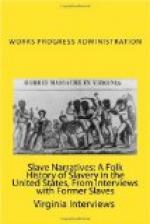“In 1886 when the present Atlantic Coast Line Railroad was called the S.F.W. and I was coming from Savannah to Florida, some tramps intent upon robbery had removed spikes from the bridge and just as the alarm was given and the train about to be thrown from the track, I raised the window and jumped to safety. I then walked back two miles to report it. More than 70 were killed who might have been saved had they jumped as I did. As a result, the S.F. and W. gave me a free pass for life with which I rode all over the United States and once into Canada.” He proudly displays this pass and states that he would like to travel over the United States again but that the school keeps him too close.
“I had been very sick but took no medicine; my wife went out to visit Sister Nancy—shortly afterwards I heard what sounded like walking, and in my imagination saw death entering, push the door open and draw back to leap on me; I jumped through the window, my shirt hung, but I pulled it out. Mr. Hodges, a Baptist preacher was hoeing in his garden next door, looked at me and laughed. A woman yelled ’there goes Reverend Andrews, and death is on him.’ I said ’no he isn’t on me but he’s down there.’ Pretty soon news came that Reverend Hodges had dropped dead. Death had come for someone and would not leave without them. I was weak and he tried me first. Reverend Hodges wasn’t looking, so he slipped up on him.”
“Parson” came to Umatilla, Florida, in 1882 from Georgia with a Mr. Rogers brought him and six other men, their wives and children, to work on the railroad; he was made the section “boss” which job he held until a white man threatened to “dock” him because he was wearing a stiff shirt and “setting over a white man” when he should have a shovel. This was the opinion of a man in the vicinity, but another white friend, named Javis warned him and advised him not to leave Umatilla, but persuaded him to work for him cutting cord wood; although “Parson” had never seen wood corded, he accepted the job and was soon given a pass to Macon, Georgia, to get other men; he brought 13 men back and soon became their “boss” and bought a house and decided to do a little hunting. When he left this job he did some hotel work, cooked and served as train porter. In 1892 he was ordained to preach and has preached and pastored regularly from that time up to two years ago.
He is of medium size and build and partially bald-headed; what little hair he has is very grey; he has keen eyes; his eyesight is very good; he has never had to wear glasses. He is as supple as one half his age; it is readily demonstrated as he runs, jumps and yells while attending the games of his favorite pastimes, baseball and football. Wherever the Edward Waters College football team goes, there “Parson” wants to go also. Whenever the crowd at a game hears the scream “Come on boys,” everyone knows it is “Parson” Andrews.
“Parson” has had two wives, both of whom are dead, and is the father of eight children: Willis (deceased) Johnny, Sebron Reece of Martin, Tennessee, Annie Lee, of Macon, Georgia, Hattie of Jacksonville, Ella (deceased) Mary Lou Rivers of Macon, Georgia, and Augustus somewhere-at-sea.




